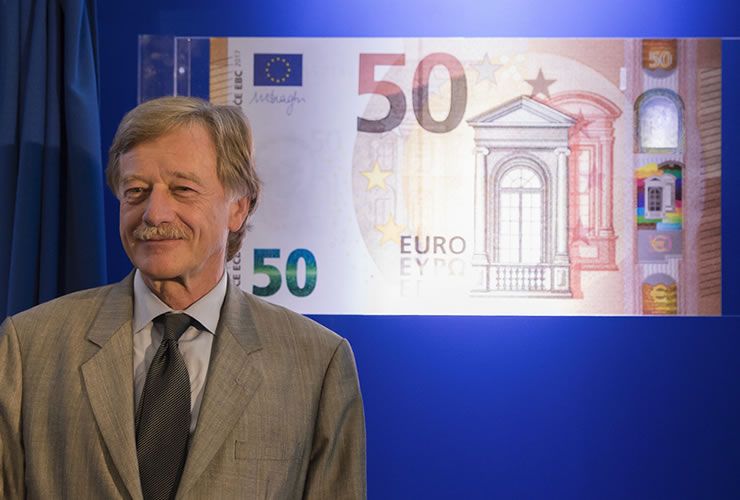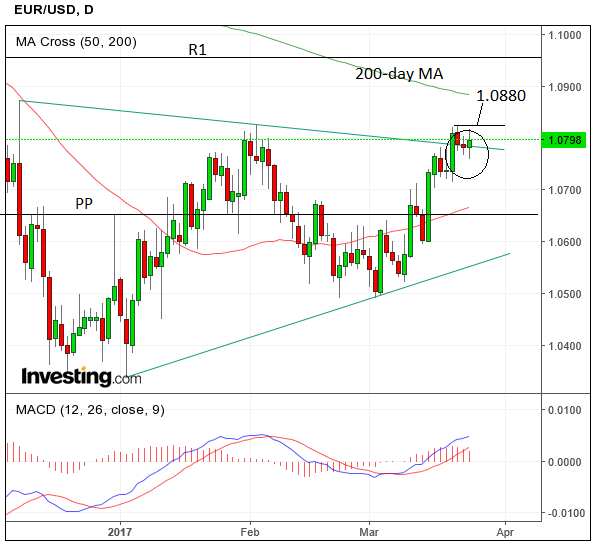Euro to US Dollar Week-Ahead Outlook: Edging Out of Range, Strong Start to the Week as Trump's Health Reform Agenda Fails

The Euro has charged higher against the US Dollar at the start of the new week with EUR/USD being quoted at 1.0884 at the time of writing.
The gains come amidst broad-based US Dollar selling emnating from the failure of US President Donald Trump to pursue his healthcare reform agenda.
Markets now believe it will be harder for Trump to push forward with planned tax cuts and spending increases now that Congress has shown its teeth and won't necessary rubber-stamp Trump's agenda.
"Risk sentiment remained negative at the start of trading this week in Asia, as markets continue to assess the fallout from the withdrawal of the healthcare bill in the US last week. It raises questions about the US administration’s ability to implement its pro-growth policies," say Lloyds Bank in a briefing to their commercial banking clients.
The rally higher reinforces EUR/USD's short-term uptrend which has been fuelled by improving economic conditions in the Eurozone and a deleveraging of political risk since the defeat of the anti-EU PVV party in the Dutch elections.
The pair is now piercing above the trendline connecting the December 2016 and January 2017 highs, capping the top of its multi-month range.

So far it has gained a foothold above the trendline but there has been a lack of follow-through to the upside, and now the exchange rate has pulled back to the trendline in a ‘throwback’ move.
This sometimes happens after breakouts but is merely a temporary cessation before another move unfolds in the direction of the breakout.
For reconfirmation of an extension higher, we would be looking for a break above the 1.0825 highs and a continuation to a target at 1.0880, just below the 200-day moving average.
Week Ahead for the Euro
Inflation data for March, released on Friday, March 31 at 9.00 GMT is the big release for the Euro in the next five days.
There has been much talk of the European Central Bank (ECB) winding down its stimulus efforts in the face of higher inflation and improving growth outlook for the region, however, inflation will be the main gauge watched by the ECB to determine their timing of such cuts.
A reduction of monetary stimulus would be positive for the Euro as it would result in higher interest rates which tend to attract more foreign capital.
Headline inflation is forecast to show a 1.8% rise in March year-on-year.
It is Core Inflation which will be more impactful, however, because it removes the short-term volatility from oil and food, and is, therefore, likely to provide a clearer picture of the Eurozone’s real underlying inflation from economic growth.
If Core Inflation rises by more than expected the Euro will probably appreciate because it will increase the chances of the ECB normalising monetary policy and increasing interest rates. Higher interest rates are generally beneficial for a currency as they attract more foreign investment seeking higher returns.
Analysts at TD Securities think that there is a chance Eurozone (headline) inflation will slowdown in March; commenting on German CPI data they said:
“We look for inflation to ease off in March after Feb’s strong 2.2% (yoy) print, as the contribution from oil prices declines due to both lower base effects and their outright decline in March, and the timing of Easter leads to a further dip.”
Week Ahead for the Dollar
US data has been strong in recent weeks, with Durable Goods Orders showing robust gains, New Home Sales rising by 6.1% and the Current Account deficit shrinking – all positives for the Dollar going forward.
In the week ahead, however, all eyes will be trained on Personal Consumption Expenditure (PCE), out on Friday, March 31 at 12.30 GMT because it has a material impact on Federal Reserve Policy.
Investors were disappointed after the Fed March meeting and sold the Dollar, because Fed members continued to show distrust at the economic recovery, and seemed unlikely to raise interest rates at their June meeting.
If Core PCE rises above its 1.7% February result (yearly) or beats expectations of a 0.2% month-on-month gain, however, this will increase expectations of a June interest rate rise and bolster the Dollar.
Higher interest rates are supportive of a currency as they attract more inflows of foreign capital seeking yield.
TD Securities expect Headline PCE to rise above 2.0%, signalling steeper rises in inflation and more gains, potentially, for the Dollar.
The other main data highlight for the Dollar ia Michigan Sentiment in March put at 14.00 on Friday, which is forecast to remain at 97.6, and Expectations which are expected to rise to 87.0 from 86.7 in the previous month.
Save
